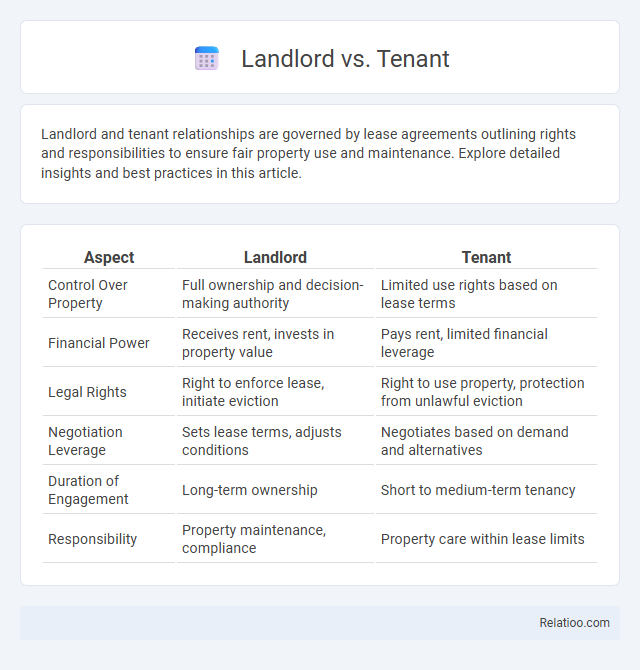Landlord and tenant relationships are governed by lease agreements outlining rights and responsibilities to ensure fair property use and maintenance. Explore detailed insights and best practices in this article.
Table of Comparison
| Aspect | Landlord | Tenant |
|---|---|---|
| Control Over Property | Full ownership and decision-making authority | Limited use rights based on lease terms |
| Financial Power | Receives rent, invests in property value | Pays rent, limited financial leverage |
| Legal Rights | Right to enforce lease, initiate eviction | Right to use property, protection from unlawful eviction |
| Negotiation Leverage | Sets lease terms, adjusts conditions | Negotiates based on demand and alternatives |
| Duration of Engagement | Long-term ownership | Short to medium-term tenancy |
| Responsibility | Property maintenance, compliance | Property care within lease limits |
Understanding the Landlord-Tenant Relationship
The landlord-tenant relationship is governed by lease agreements that define rights and responsibilities, ensuring legal protection for both parties. Landlords provide property access and maintenance, while tenants are obligated to pay rent and adhere to property rules. Exploitation occurs when one party abuses power, such as landlords imposing unlawful fees or tenants damaging property, disrupting the balance essential for fair housing practices.
Rights and Responsibilities of Landlords
Landlords hold specific rights and responsibilities including maintaining safe, habitable property standards and ensuring timely repairs to protect tenants' welfare. They have the legal right to collect rent and enforce lease agreements while respecting tenants' privacy and providing proper notice before entry. Exploitation occurs when landlords neglect these duties or impose unfair conditions, violating tenant rights and local housing laws.
Tenant Rights: What Every Renter Should Know
Tenant rights are critical legal protections designed to prevent exploitation by landlords and ensure safe, habitable living conditions. Key rights include the right to timely repairs, protection against unlawful eviction, and the right to privacy, which landlords must respect by providing proper notice before entering the rental unit. Understanding local tenant laws, such as rent control measures and eviction procedures, empowers renters to assert their rights and seek legal recourse when facing exploitation.
Common Causes of Landlord-Tenant Disputes
Common causes of landlord-tenant disputes often include non-payment of rent, property maintenance issues, and violations of lease agreements. Landlords may exploit tenants by neglecting repairs or attempting wrongful evictions, while tenants might withhold rent due to unsafe living conditions. Understanding local tenant rights and landlord responsibilities is crucial to resolving exploitation and minimizing conflicts in rental housing.
Lease Agreements: Key Clauses and Considerations
Lease agreements form the foundation of the landlord-tenant relationship, with key clauses addressing rent terms, maintenance responsibilities, and duration of tenancy. Critical considerations include clarity on security deposits, provisions for lease termination, and remedies for breach to prevent exploitation. Properly drafted agreements ensure rights and obligations are balanced, reducing risks of unfair treatment or legal disputes between landlords and tenants.
Security Deposits: Regulations and Best Practices
Security deposits are governed by specific state and local regulations designed to protect both landlords and tenants, with strict rules on maximum amounts, usage, and timely return. You must understand your rights and responsibilities regarding the deposit's purpose, conditions for withholding, and documentation to avoid exploitation or unlawful deductions. Following best practices includes detailed move-in/move-out inspections, written agreements, and clear communication to ensure fair handling and minimize disputes.
Eviction Process: Legal Steps for Landlords and Tenants
The eviction process involves specific legal steps that landlords must follow, including providing formal notice to tenants, filing an eviction lawsuit, and obtaining a court order before removal. Tenants have rights to contest eviction by responding to the complaint, attending hearings, and potentially seeking legal aid or mediation services to dispute claims of lease violations or nonpayment. Exploitation can occur when landlords bypass legal procedures or tenants face retaliation, highlighting the need for strict adherence to eviction laws and tenant protection regulations.
Maintenance and Repair Obligations
Landlord maintenance and repair obligations typically include ensuring the property's structural integrity, plumbing, heating, and electrical systems are in good working order to meet habitability standards. Tenants must report issues promptly and maintain reasonable care of the premises to avoid exacerbating damages or incurring penalties. Exploitation arises when landlords neglect essential repairs, leading to unsafe living conditions or when tenants cause damage beyond normal wear, resulting in disputes over responsibility and legal consequences.
Conflict Resolution: Mediation and Legal Support
Conflict resolution between landlords and tenants often involves mediation services that facilitate communication and negotiation to reach mutually acceptable agreements. Legal support plays a crucial role in addressing exploitation cases by ensuring the enforcement of tenant rights and landlord obligations under housing laws. Access to professional mediation and legal resources helps reduce disputes, prevent eviction abuses, and promote fair housing practices.
Tips for a Successful Landlord-Tenant Relationship
Clear communication and written agreements help prevent disputes between landlords and tenants, ensuring both parties understand their rights and responsibilities. Promptly addressing maintenance requests and respecting privacy create a respectful living environment that discourages exploitation. Establishing transparent rent policies and fair conflict resolution mechanisms promotes trust and fosters a successful landlord-tenant relationship.

Infographic: Landlord vs Tenant
 relatioo.com
relatioo.com